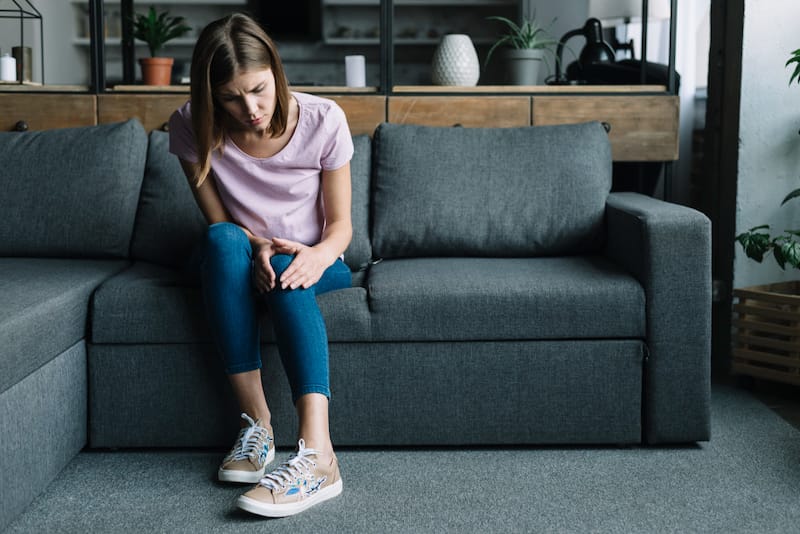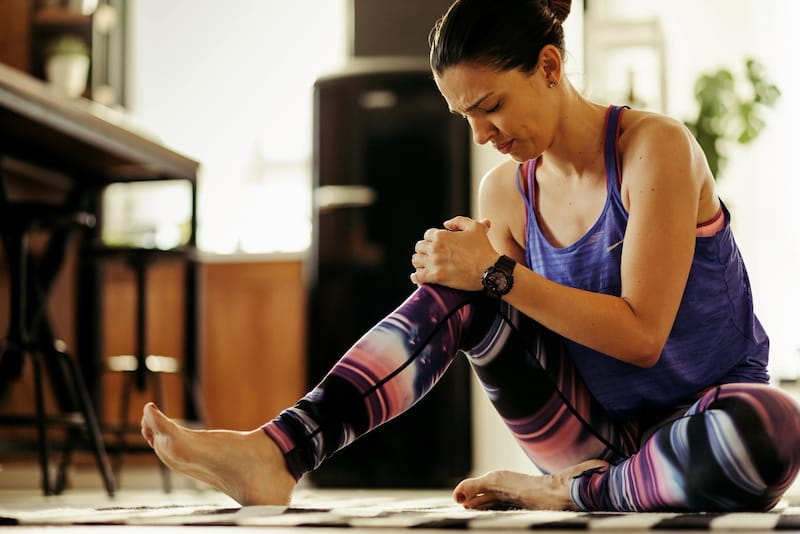Anxiety can cause various physical symptoms, such as leg pain. You should identify your stressors and try to step away from them to alleviate anxiety symptoms. You could also try deep breathing exercises, yoga, or meditation, and simply finding comfort in how you’re sitting can vastly improve how you’re feeling.
Anxiety causes pain in the legs because when you feel stressed or anxious, it builds tension throughout your body, which turns into actual pain after a period of time.
Anxiety is one of the most common mental health disorders in modern society.
👉 About 18 percent of Americans suffer from an anxiety disorder at some point in their lives, according to the National Institute of Mental Health (NIMH).
Many people believe that they’re alone when they experience anxiety—that they’re simply suffering from a bad case of nerves and nothing more serious.
Unfortunately, that’s not always true.
While there are many different causes of leg pain, anxiety can be a significant one. In fact, anxiety can cause or exacerbate leg pain in as many as 70% of cases.
It’s not just that anxiety makes you more likely to experience pain—it also causes it.
When you’re anxious, your body releases hormones that make you feel more pain and less comfortable, which means that even when the source of your pain isn’t directly related to anxiety, it feels like it is.
You can manage anxiety and leg pain
The good news is that there are ways to manage your anxiety so that it doesn’t cause as much pain in your legs.

The first step is to identify what types of situations or events make you anxious and then develop strategies for managing them before they happen (for example, by scheduling time away from work during stressful times).
You should also find ways to cope with the stressors in your life without letting them affect how well you perform at work or school (for example, by using relaxation techniques such as deep breathing exercises or meditation).
Many people who suffer from anxiety develop painful conditions in their legs and feet due to poor circulation or muscle weakness caused by stress on the nervous system.
These symptoms may include:
- Pain or swelling in your lower legs
- Redness around your ankles
- Muscle spasms (especially if you’ve been sitting for long periods)
- Ankles that feel stiff when you walk
- Painful joints (such as knees or elbows)
- A feeling of “pins and needles” sensations
How long does muscle tension from anxiety last?
Muscle tension from anxiety can last for days, weeks, or even months.

It’s important to keep in mind that everyone responds differently to stress and anxiety.
For example, if you’re someone who experiences a lot of anxiety muscle tension, it may take longer for you to recover than someone who experiences milder levels of anxiety muscle tension.
The best way to know how long your anxiety muscle tension will last is by tracking it over time with a journal or spreadsheet.
Some people find it helpful to write down the symptoms they experience during their episodes of anxiety muscle tension; others find it helpful simply to write down the date and time each episode began.
You should also keep track of when you feel the most symptoms (for example, what time of day do you usually feel more symptoms?).
This information will help you understand what triggers your episodes of anxiety and muscle tension and how they change from day to day.
How can I relieve leg pain caused by anxiety?
If you’re suffering from anxiety-induced leg pain, there’s hope.
Here are some tips to help you ease your pain and get back to your usual routine:
- Try deep breathing exercises. Take long, slow breaths in through your nose and out through your mouth.
- Try walking around the block or going for a short walk every day.
- Try meditation or yoga. Yoga is great because it focuses on breathing methods that help with anxiety, and breathing exercises can help reduce anxiety-related pain.
- Take a long, hot shower or bath. This will relax your muscles and help them regain their strength.
- Find a comfortable way to sit. If you’re sitting on the edge of a chair, make sure the backrest isn’t too high or too low. Also, try sitting on a couch or recliner with lower cushions than usual.
- Keep your head up! Avoid looking down at your legs or feet when you’re sitting down. If you have trouble being still and not looking at your legs, try using pillows or other items to prop up your feet while they’re resting on something else (like a table).
- Keep moving! Take breaks from sitting at least every 30 minutes. It’ll help your muscles relax and prevent cramps from forming in your calves and ankles.
Can anxiety affect how I walk?
Anxiety can make it hard to stay focused and make you feel light-headed, dizzy, or nauseous.
These symptoms may cause you to have difficulty walking and standing. If you experience these symptoms while walking, they may be due to anxiety.
If you notice that your anxiety has affected your ability to walk or stand, here are some tips to help you get back on track:
- Use a walking stick if needed (but only if it’s safe for you).
- Wear comfortable shoes with good support, so your feet don’t hurt too much when walking.
- Ensure you drink enough water throughout the day, so you don’t become dehydrated from dehydration.
FAQs
What are the other physical symptoms of anxiety?
Other physical symptoms of anxiety include fatigue, shortness of breath, heart palpitations, increased heart rate, and dizziness.
Anxiety comes with many physical symptoms, but accepting them may help alleviate the stress and/or fears that come with these stressors.
Conclusion
Anxiety may interfere with your daily life if it has physical symptoms such as leg pain and/or muscle tension. It can even cause breathing problems.
The duration of leg pain due to anxiety may also vary, and to identify how long this lasts, you should track it in a journal or a spreadsheet.
There are also many ways to combat leg pain caused by anxiety; for example, try walking around for a few minutes to alleviate the leg pain itself.
You could also try meditating to help with your anxiety.


